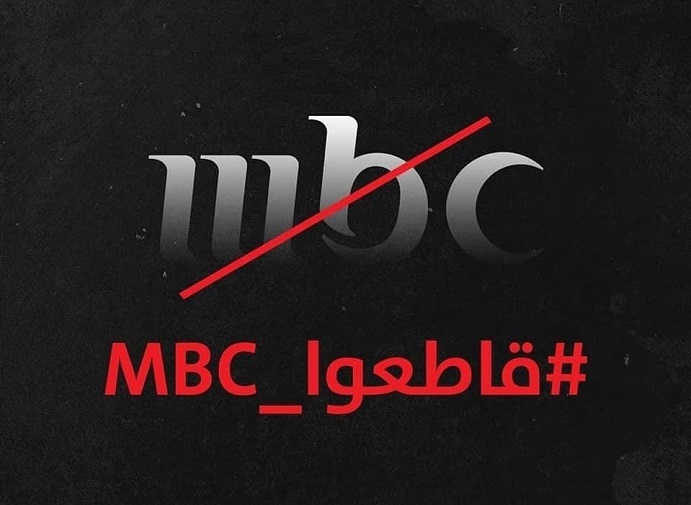Tamara Nassar
The Electronic Intifada / May 4, 2020
Palestinians are calling for a boycott of the TV network MBC for broadcasting two television series carrying messages promoting normalization with Israel.
Umm Haroun and Exit 7, are being broadcast by the Saudi-owned channel during Ramadan.
“It exceeded normalization to the point of complete treachery,” PACBI, the Palestinian Campaign for the Academic and Cultural Boycott of Israel, stated.
PACBI is calling on viewers to boycott MBC during Ramadan unless it stops broadcasting the series, and for companies not to advertise on the network.
Scene in question
One scene in Exit 7 particularly sparked outrage among viewers.
It shows two characters, played by Saudi actors Nasser al-Qasabi and Rashid al-Shamrani, discussing doing business with Israelis.
“So what?” al-Shamrani’s character says.
“The enemy is the one who does not appreciate your stance towards him, and who curses you day and night, more than the Israelis,” he says, alluding to Palestinians, who are often accused by some Saudi regime media of being ungrateful to Saudi Arabia.
Al-Qasabi asks him to elaborate.
“Everything in our lives is about Palestine. We fought wars for Palestine. We cut off the oil for Palestine,” al-Shamrani responds, apparently referring to the 1973 oil embargo.
“The day they formed [the Palestinian Authority], we started paying for salaries at the expense of our own priorities. As soon as they find a chance, they attack Saudi Arabia.”
Covert relations between Saudi Arabia and Israel go back decades.
“Exit 7 is trying to promote in the minds of our region that Israel is a ‘brotherly and friendly neighbour’ rather than a criminal enemy,” PACBI said.
Umm Haroun, the other MBC series, has also caused outrage among viewers.
It tells the story of a Jewish woman who lived in Bahrain in the 1940s speaking of her Jewish Arab heritage.
The series begins with the announcement of the creation of Israel, glossing over the Nakba of 1948, when 800,000 Palestinians were ethnically cleansed from their lands by Zionist militias.
The series explicitly refers to Palestine as the “Land of Israel.”
This “falsifies history,” PACBI stated, “in preparation for further normalization with the enemy.”
Israel’s Arabic-language propaganda Twitter account celebrated the two television shows and denounced the outrage against them.
This comes in the context of a big rise in normalization in recent years between Israel and the bloc of US-backed Gulf states led by Saudi Arabia.
Some Gulf states have been laying the groundwork for such an overt display by allowing Israeli athletes to compete in their countries, conducting business transactions with Israelis and promoting ties with Israel under the guise of religious and cultural tolerance.
No Gulf state has formal diplomatic ties with Israel.
PACBI praised Kuwait for resisting the trend of normalization with Israel.
Government-owned channel
As of 2018, the Saudi government owns 60 percent of MBC Group, which is headquartered in Dubai.
MBC was founded in 1991 by businessmen Saleh Kamel and Waleed al-Ibrahim, whose sister was married to Saudi Arabia’s late King Fahd.
The company built a huge audience in the Middle East and Saudi Crown Prince Mohammed bin Salman started purchasing shares in the company in recent years.
In November 2017, as he consolidated power as Saudi Arabia’s de facto ruler, the crown prince rounded up hundreds of the country’s elite and government officials in the Ritz-Carlton hotel in Riyadh, where they were forcibly held for weeks.
Kamel and al-Ibrahim were among those detained at the hotel.
Months after al-Ibrahim’s release, it was announced that the Saudi government acquired 60 percent of MBC Group’s shares.
It was only after agreements transferring ownership were finalized that al-Ibrahim was allowed to leave the country.
The End
Meanwhile, an Egyptian television series called The End, has sparked controversy of another calibre.
It is set in the year 2120, on a post-apocalyptic Earth dominated by cyborg clones. In the first episode, a teacher is seen explaining to students the fall of the United States and Israel.
“All the states of North America were united, and its name was the United States of America, until it started to weaken, disintegrate and fight,” he says.
“The United States of America was the main supporter of the Zionist state. When Arab countries had the opportunity to rid themselves of their archenemy, a war erupted, which had come to be called the War to Liberate Jerusalem.”
Israel’s foreign ministry condemned the show as “unfortunate and totally unacceptable, especially between countries that have [had] a peace agreement between them for the past 41 years,” The Jerusalem Post reported.
Jordan and Egypt are the two only Arab countries to have formal diplomatic ties with Israel, although relations are widely opposed among Jordanian and Egyptian citizens.
Tamara Nassar is an assistant editor at The Electronic Intifada













